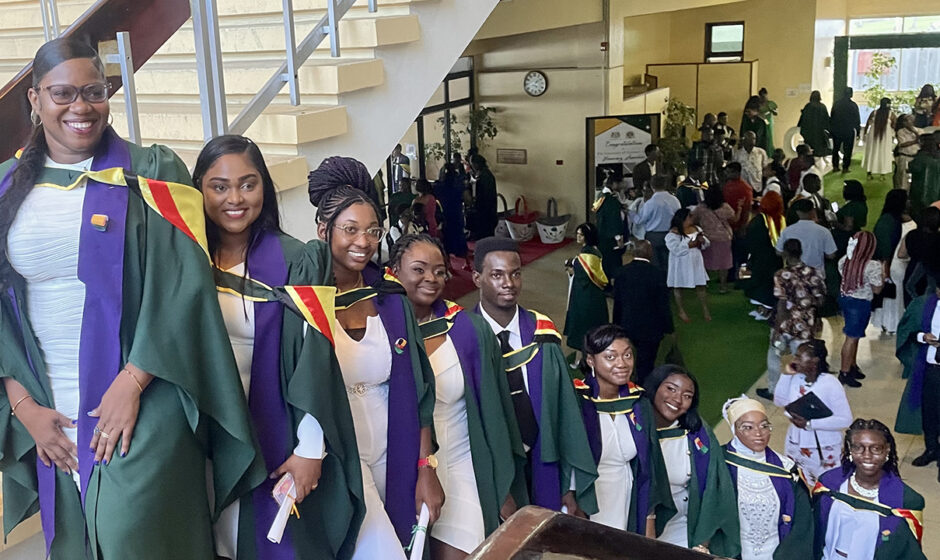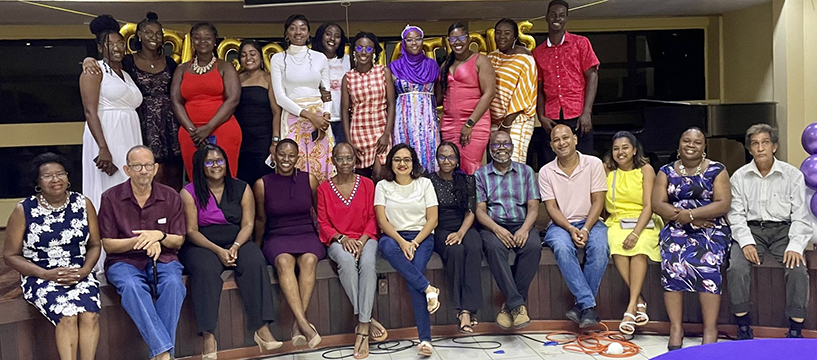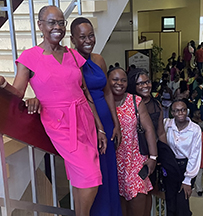Retired FAMU CAFS Administrator Celebrates First University of Guyana Food Science Graduates

When she was on sabbatical leave in fall 2017, then-Florida A&M University (FAMU) College of Agriculture and Food Sciences (CAFS) Associate Dean Verian Thomas, Ph.D., began designing the curriculum for a new bachelor’s degree program in food science at the University of Guyana (UG).
After Thomas returned to FAMU the following spring, she continued working with members of a Joint Planning Team at UG to refine the curriculum of this new degree program in Food Science before it obtained the required university approvals for its launch on UG’s campus in January 2019.

The Bachelor of Science degree in Food Science began as a multidisciplinary program, integrating the study of food science, agriculture, chemistry, biology, and business. In November 2023, Professor Emerita Thomas, who retired in 2021, returned to her native Guyana on a trip partially funded by UG to witness the first thirteen UG food science graduates accept their degrees.
“Talk about experiencing a great sense of accomplishment upon seeing those graduates walk across the stage! That was how I felt as I partially compared that feeling to giving birth to a child. It’s one of the highlights of my career,” Thomas said, who as a previous UG faculty member, wanted to start a food science program there more than four decades earlier, before joining FAMU. “Returning to UG for the graduation ceremony was simply amazing,” she said. “I felt great pride in completing the unfinished business.”

During her 39-year FAMU career, Thomas served as a CAFS faculty member, and she also implemented the current food science program in CAFS. In addition, she held several academic, administrative positions in CAFS, which included being its first Associate Dean for Academic Programs. Also, she served as the Interim Dean for FAMU’s School of Graduate Studies and Research.
Located on the northern coast of South America, Guyana is considered part of the Caribbean region, since it is the only English-speaking country on the continent. The highly biodiverse country is a producer of rice and sugar, and it is rich in natural resources, such as, bauxite, gold, diamonds, fish, and shrimp. UG is the country’s only university.
Interim CAFS Dean Dale Wesson, Ph.D., said Thomas’ role in helping to start the UG program is emblematic of FAMU’s global impact.
“We applaud Dean Thomas’ remarkable endeavors,” Wesson said. “Her legacy transcends mere service to FAMU; she has planted seeds destined to enrich the lives of Guyanese for generations. The importance of global food safety and security cannot be overstated.”
The impetus for a food science program at UG came against a backdrop of then-UG Vice-Chancellor & Principal Professor Ivelaw Griffith’s vision for the establishment of an Institute for Food and Nutrition Security (IFANS) with a mission to guarantee food and nutrition security for the people of Guyana by 2030.
Griffith appointed Thomas as co-chair of the Feasibility Team to establish IFANS. As a result of her work, the University was awarded a US $49,000 grant to fund the Feasibility Study for the establishment of IFANS, which was launched in 2018.
“The first two years of the undergraduate food science program are intended to establish a solid background in math, chemistry, physical and biological sciences. Required courses include food science, introductory and organic chemistry, biology, microbiology, calculus, physics, and nutrition. The last two years emphasize the application of the basic sciences and technology to the manufacturing, sensory evaluation, storage, distribution, and safety of foods and food ingredients,” Thomas said.
“As Guyana positions itself to reduce food imports by 25 percent by 2025, there is an urgent need for persons with competencies in the areas of food product development, food processing and preservation, and food safety,” Thomas continued. “This cohort of food scientists has been adequately trained to assume these positions in existing food manufacturing entities, and to create start-ups of their own.”



